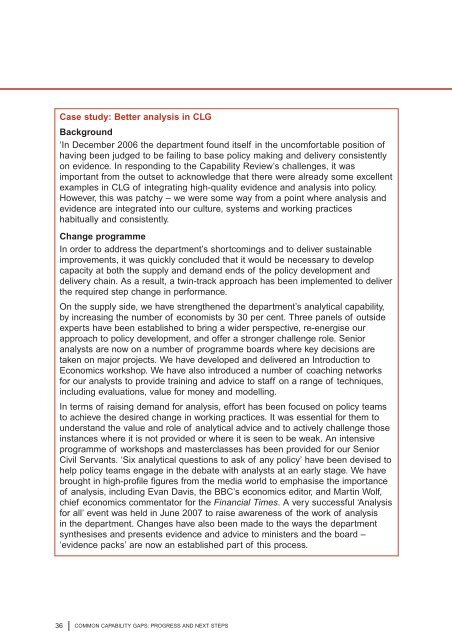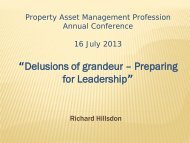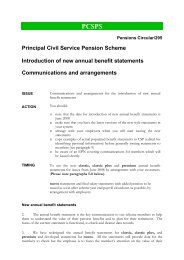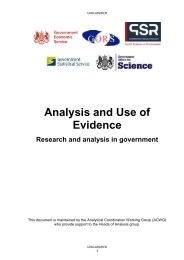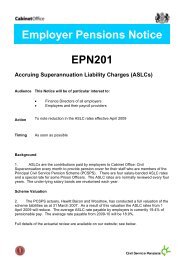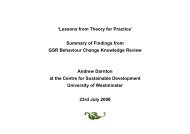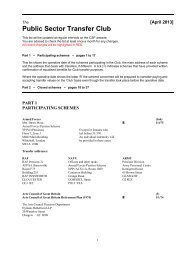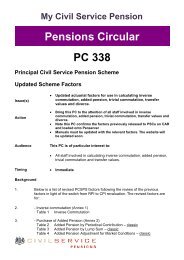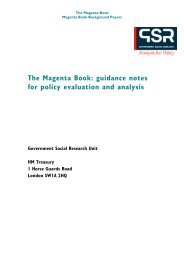Capability Reviews: Progress and Next Steps - The Civil Service
Capability Reviews: Progress and Next Steps - The Civil Service
Capability Reviews: Progress and Next Steps - The Civil Service
- No tags were found...
Create successful ePaper yourself
Turn your PDF publications into a flip-book with our unique Google optimized e-Paper software.
Case study: Better analysis in CLGBackground‘In December 2006 the department found itself in the uncomfortable position ofhaving been judged to be failing to base policy making <strong>and</strong> delivery consistentlyon evidence. In responding to the <strong>Capability</strong> Review’s challenges, it wasimportant from the outset to acknowledge that there were already some excellentexamples in CLG of integrating high-quality evidence <strong>and</strong> analysis into policy.However, this was patchy – we were some way from a point where analysis <strong>and</strong>evidence are integrated into our culture, systems <strong>and</strong> working practiceshabitually <strong>and</strong> consistently.Change programmeIn order to address the department’s shortcomings <strong>and</strong> to deliver sustainableimprovements, it was quickly concluded that it would be necessary to developcapacity at both the supply <strong>and</strong> dem<strong>and</strong> ends of the policy development <strong>and</strong>delivery chain. As a result, a twin-track approach has been implemented to deliverthe required step change in performance.On the supply side, we have strengthened the department’s analytical capability,by increasing the number of economists by 30 per cent. Three panels of outsideexperts have been established to bring a wider perspective, re-energise ourapproach to policy development, <strong>and</strong> offer a stronger challenge role. Senioranalysts are now on a number of programme boards where key decisions aretaken on major projects. We have developed <strong>and</strong> delivered an Introduction toEconomics workshop. We have also introduced a number of coaching networksfor our analysts to provide training <strong>and</strong> advice to staff on a range of techniques,including evaluations, value for money <strong>and</strong> modelling.In terms of raising dem<strong>and</strong> for analysis, effort has been focused on policy teamsto achieve the desired change in working practices. It was essential for them tounderst<strong>and</strong> the value <strong>and</strong> role of analytical advice <strong>and</strong> to actively challenge thoseinstances where it is not provided or where it is seen to be weak. An intensiveprogramme of workshops <strong>and</strong> masterclasses has been provided for our Senior<strong>Civil</strong> Servants. ‘Six analytical questions to ask of any policy’ have been devised tohelp policy teams engage in the debate with analysts at an early stage. We havebrought in high-profile figures from the media world to emphasise the importanceof analysis, including Evan Davis, the BBC’s economics editor, <strong>and</strong> Martin Wolf,chief economics commentator for the Financial Times. A very successful ‘Analysisfor all’ event was held in June 2007 to raise awareness of the work of analysisin the department. Changes have also been made to the ways the departmentsynthesises <strong>and</strong> presents evidence <strong>and</strong> advice to ministers <strong>and</strong> the board –‘evidence packs’ are now an established part of this process.36 COMMON CAPABILITY GAPS: PROGRESS AND NEXT STEPS


